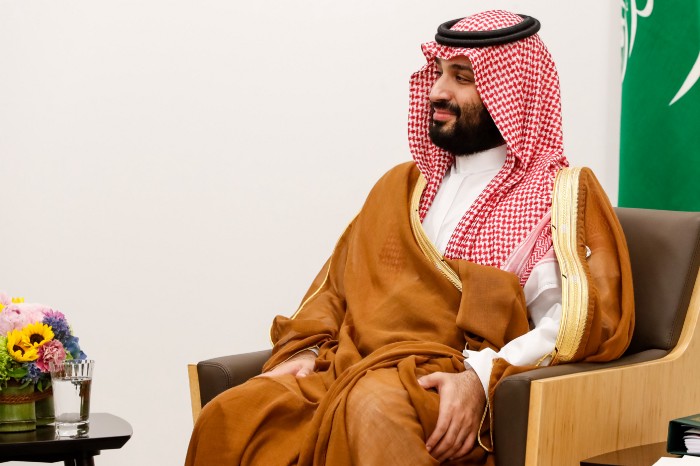U.S. intelligence has found Saudi Crown Prince Mohammed bin Salman culpable in the 2018 killing of Jamal Khashoggi. It still isn’t clear what, if anything, the Biden Administration can do about it.
The Biden Administration released an intelligence report this week on Saudi Crown Prince Muhammad bin Salman’s role in the killing of Jamal Khashoggi, the dissident and Washington Post columnist who was drugged and dismembered in 2018.
“We assess that Saudi Arabia’s Crown Prince Muhammad bin Salman approved an operation in Istanbul, Turkey to capture or kill Saudi journalist Jamal Khashoggi,” the intelligence report released by U.S. officials said.
U.S. intelligence agencies say their assessment was based on MBS’s, “control of decision-making in the Kingdom, the direct involvement of a key adviser and members of Muhammed bin Salman’s protective detail in the operation, and the Crown Prince’s support for using violent measures to silence dissidents abroad, including Khashoggi.”


U.S. Secretary of State Anthony Blinken added a new category of sanctions he called the “Khashoggi ban”.
According to Blinken, this ban will allow the State Department, “to impose visa restrictions on individuals who, acting on behalf of a foreign government, are believed to have been directly engaged in serious, extraterritorial counter-dissident activities, including those that suppress, harass, surveil, threaten or harm journalists or other persons perceived to be dissidents for their work, or who engage in such activities with respect to the families or other close associates of such persons,” Blinken said in a statement.
“We have taken action pursuant to what we’re calling the Khashoggi Ban to impose visa restrictions on 76 Saudi individuals believed to have been engaged in threatening dissidents overseas, including but not limited to the Khashoggi killing,” he added.
The New York Times reported that President Biden would not punish MBS, “Fearing Relations Breach.”
“Biden has decided that the price of directly penalizing Saudi Arabia’s crown prince, Mohammed bin Salman, is too high, according to senior administration officials,” The Times reported. “Biden’s aides said that as a practical matter, Prince Mohammed would not be invited to the United States anytime soon, and they denied that they were giving Saudi Arabia a pass, describing a series of new actions on lower-level officials intended to penalize elite elements of the Saudi military and impose new deterrents to human rights abuses.”
The decision by Mr. Biden, who during the 2020 campaign called Saudi Arabia a “pariah” state with “no redeeming social value,” came after weeks of debate in which his newly formed national security team advised him that, “there was no way to formally bar the heir to the Saudi crown from entering the United States, or to weigh criminal charges against him, without breaching the relationship with one of America’s key Arab allies,” The Times added.

Human rights groups have applauded the official intelligence finding, but many are arguing that more must be done to hold the crown prince accountable.
Human Rights Watch, one of the main advocates for moving human rights issues to the center of American diplomacy, praised the release of the report and said it made “clear that the U.S. needs to act now to put human rights at the forefront of its relationship with Saudi Arabia.”
Following the intelligence reports implicating Bin Salman, House Speaker Nancy Pelosi said in a statement that the, “United States government must re-evaluate and recalibrate the relationship with Saudi Arabia, given the findings of this report, which are part of a disturbing pattern of human rights abuses from the Kingdom.”
Rep. Adam Schiff said there, “ought to be a personal consequence” for the crown prince over Khashoggi’s death, arguing “it won’t be enough to simply sanction the state or call for the sanctions of other individuals.”
The scope of the U.S. government to impose personal consequences on MBS are, however, limited. The Saudi crown prince is, of course, not beholden to U.S. laws. Nor have the findings in the intelligence report been heard as evidence in a court of law, U.S., international or Saudi.
A few hours after the release of the report and the new sanctions, the Saudi government strongly denied the allegations.
“The kingdom of Saudi Arabia completely rejects the negative, false and unacceptable assessment in the report pertaining to the kingdom’s leadership, and notes that the report contained inaccurate information and conclusions,” it wrote. “It is truly unfortunate that this report, with its unjustified and inaccurate conclusions, is issued while the kingdom had clearly denounced this heinous crime, and the kingdom’s leadership took the necessary steps to ensure that such a tragedy never takes place again.”
When President Biden was asked about repercussions for the crown prince, he said “There will be an announcement on Monday as to what we are going to be doing with Saudi Arabia generally.”
“The administration took a wide range of new actions on Friday. The president is referring to the fact that on Monday, the State Department will provide more details and elaborate on those announcements, not new announcements,” a White House official later clarified for Reuters.
(Contributing journalist, Allegra Nokaj) (Contributing writer, Brooke Bell)